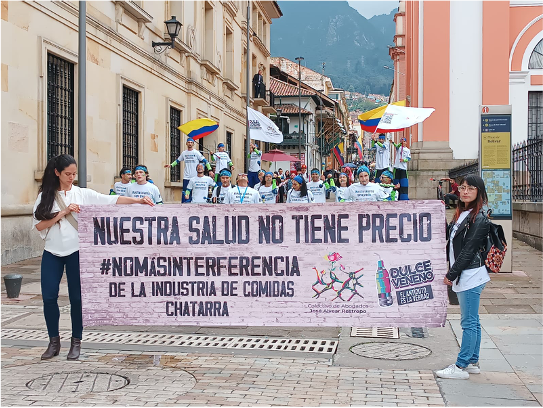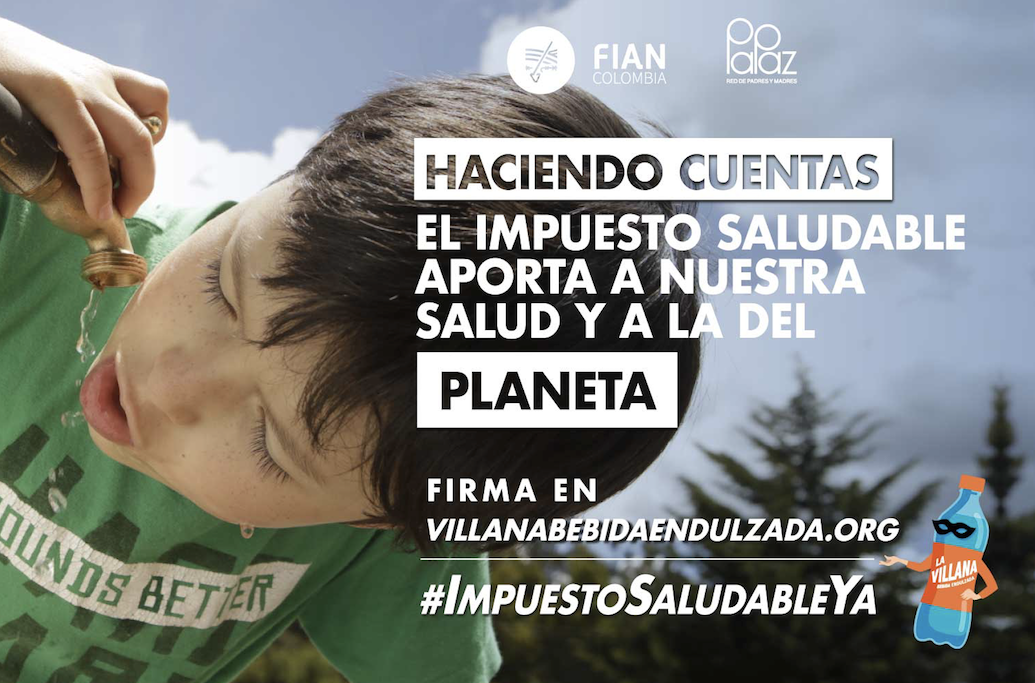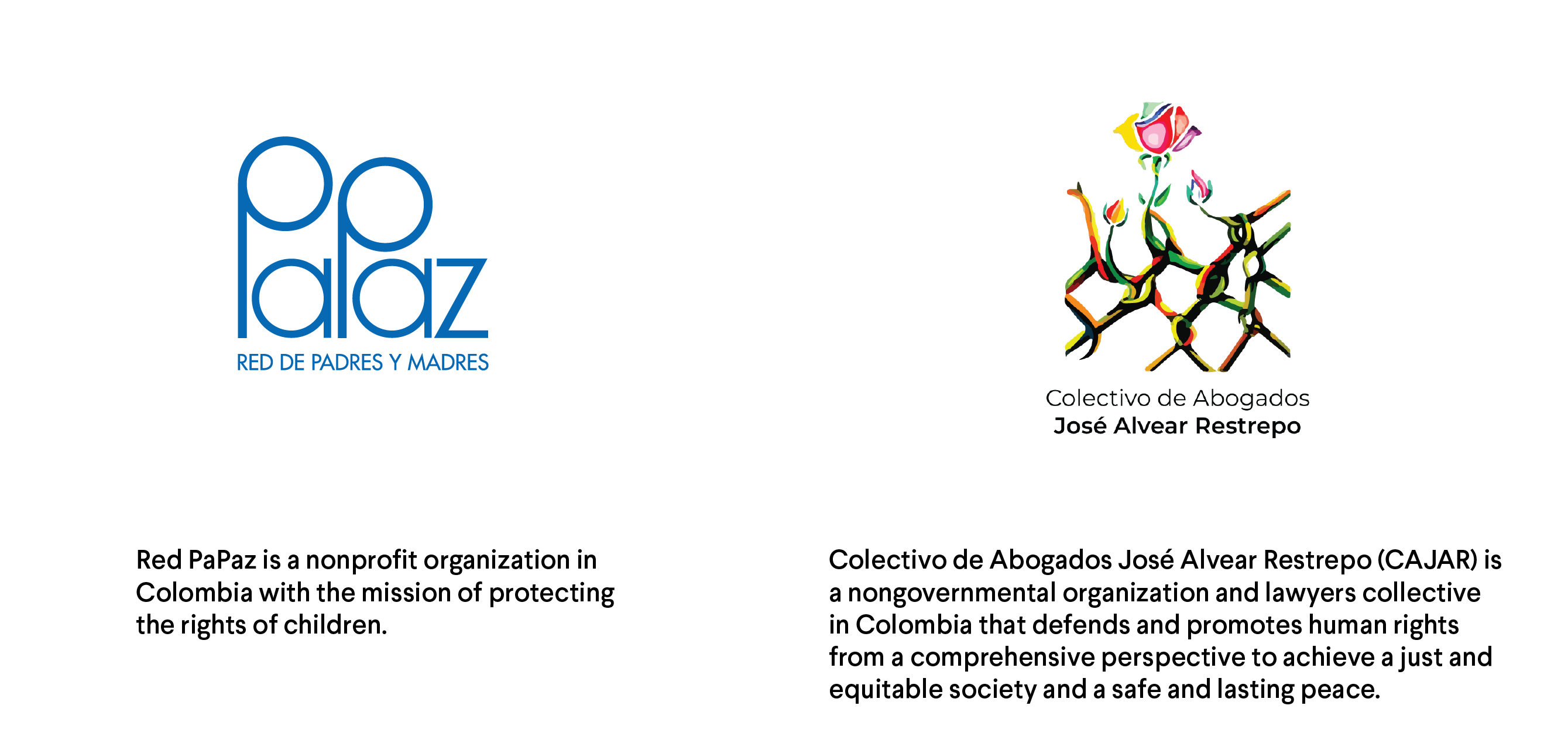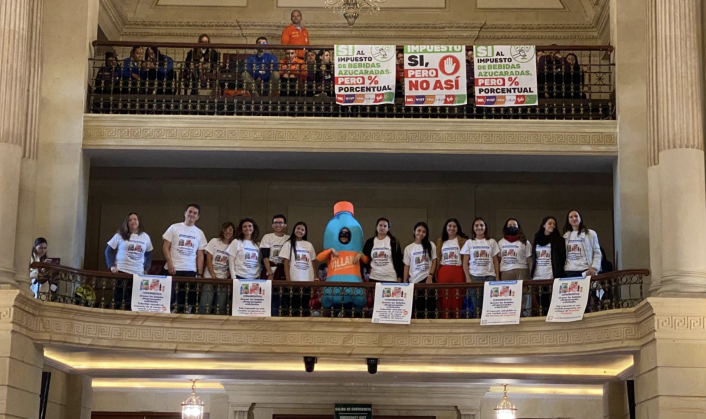
“Healthy Taxes Now” (#ImpuestoSaludableYa) was a mass media campaign that aired in Colombia in 2022 to build support for proposed taxes on sugar-sweetened beverages.
tax on sugar-sweetened beverages, to be fully implemented in Colombia by 2025.
People who regularly consume sugar-sweetened drinks—1 to 2 cans a day or more—have a 26% greater risk of developing Type 2 diabetes than people who rarely consume such drinks. Taxation is one of the most effective ways to reduce purchases: Evidence from the U.S. shows that a tax on sugar-sweetened drinks that raises prices by 20% can lead to a reduction in consumption of around 20%. In Mexico, two years after the introduction of a tax on sugar-sweetened drinks, households reduced their purchases of those products by 7.6% and households with the fewest resources reduced their purchases by 11.7%. (Sources)
In 2012, Latin America became the world’s leading consumer of sugar-sweetened beverages. When Vital Strategies’ Food Policy Program began in 2016, advocates and civil society organizations in Colombia were already pushing for a tax on sugar-sweetened beverages. In the seven years since then, there have been seven mass media campaigns, 10,224 signatures of support, a global pandemic, fierce opposition from the food and beverage industry, three changes of president and one mighty effort from Colombian civil society partners. The result? In December 2022, Colombia’s president signed the tax reform that includes a hefty tax on sugar-sweetened beverages—topping out in 2025 at 20% for the beverages highest in sugar.

When opponents of the tax organized a hearing, civil society arranged demonstrations to draw media attention, including this one organized by Vital’s partner CAJAR. It featured a batucada (a marching band) and stilt walker—a strategy discussed and approved by the entire coalition of civil society organizations working on food policy in Colombia. The demonstrations brought media attention to the issue.

“Healthy Taxes Now,” (#ImpuestoSaludableYa) was one of seven campaigns that ran in Colombia to build support for the proposed taxes on sugar-sweetened beverages.
Together with partners, Vital Strategies supported seven media campaigns that reached more than 14 million people in Colombia.
With this, we seek [to allow] consumers to make informed decisions about their diet and to reduce the consumption of ultra-processed products that have a negative impact on the health of Colombians."
Passage of the 'healthy tax' on sugary drinks and ultra-processed food is inspirational and paves the way for improving the diets and health of Colombians. It also allows other countries to see what is possible."

Vital supports local partners in five countries to research and develop strategic responses to policy proposals related to food and its impacts on health.
Vital has helped to develop close to 600 mass media campaigns to change behaviors and build support for policies on tobacco, road safety, food policy, overdose prevention and more.
Vital’s Food Policy program works in five countries and shares lessons learned between countries. In 2022, Vital and The Heart Foundation of Jamaica published an article in the journal Nutrients showing that a mass media campaign increased Jamaicans’ knowledge about the dangers of sugary drinks and increased their support for a tax on sugary drinks. Vital has also built evidence on the effectiveness of similar taxes in Mexico and South Africa.
Vital Strategies awards Healthy Food Policy Fellowships to support future leaders and build research and legal capacity in focus countries. Successful applicants are awarded a multiple-year fellowship for the duration of their Ph.D. program (up to five years) to support their studies at top universities in their home country or abroad.
Vital supports local partners in five countries to research and develop strategic responses to policy proposals related to food and its impacts on health.
Vital has helped to develop close to 600 mass media campaigns to change behaviors and build support for policies on tobacco, road safety, food policy, overdose prevention and more.
Vital’s Food Policy program works in five countries and shares lessons learned between countries. In 2022, Vital and The Heart Foundation of Jamaica published an article in the journal Nutrients showing that a mass media campaign increased Jamaicans’ knowledge about the dangers of sugary drinks and increased their support for a tax on sugary drinks. Vital has also built evidence on the effectiveness of similar taxes in Mexico and South Africa.
Vital Strategies awards Healthy Food Policy Fellowships to support future leaders and build research and legal capacity in focus countries. Successful applicants are awarded a multiple-year fellowship for the duration of their Ph.D. program (up to five years) to support their studies at top universities in their home country or abroad.
How do you talk about new taxes when the cost of living is increasing in Colombia?
We positioned the tax as necessary to improve health, and only affecting people buying unhealthy sugar-sweetened beverages.
How did Vital and our partners adapt the campaign messages so they can make the biggest impact?
We built public support for the tax by presenting it as a healthy tax that would help, not hinder, the economy. We highlighted the negative impact that sugar-sweetened beverages have on people’s health and the environmental damage caused by producing these products.
How do you choose one policy to advocate for when the issues affecting the food environment are so complex?
Taxes have been the most effective intervention to reduce purchases of harmful products including tobacco, alcohol and sugar-sweetened beverages.

The coalition of civil society organizations in Colombia, together with Vital Strategies and Global Health Advocacy Incubator, participated in the debates on the tax reform law, which includes the taxes on sugar-sweetened beverages.

In December 2022, Colombia’s president signed the tax reform that included taxes on sugar-sweetened beverages—beginning at 10% for the drinks highest in sugar in 2023 and increasing to 20% by 2025. Carolina Corcho Mejía, the Minster of Health and Social Protection at the time, tweeted the news right away.
Vital Strategies continues to support partners in Colombia so the tax can be fully implemented without manipulation from the beverage industry. We expect the tax on sugar-sweetened beverages will be a model for other countries that are grappling with the challenge of addressing poor diets and the resultant increase in noncommunicable diseases.
Join our email list and be the first to know about our public health news, publications and interviews with experts.